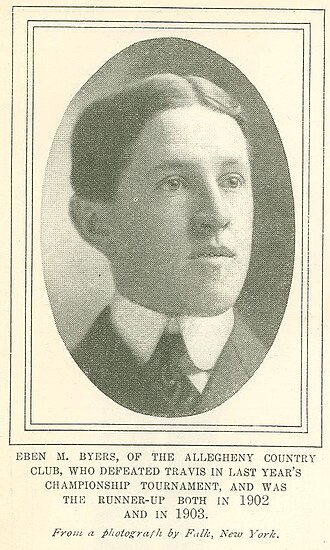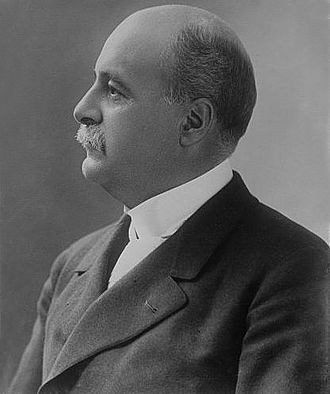Discover Your Roots
SIGN UPDiscover Your Roots
SIGN UPEben is a Hebrew name that means "Stone Of Help." It is often a short form of the name Ebenezer. The name carries the significance of being a source of support and strength, as suggested by the meaning "Stone Of Help." Notable individuals bearing the name Eben include Eben Alexander, an American author and neurosurgeon, and Eben Etzebeth, a South African rugby player. Additionally, Petr Eben, a Czech composer, and organist, and the fictional character Eben Adams from the movie "Portrait of Jennie" contribute to the diverse representation of the name. Eben is also associated with fictional characters such as Eben Cabot from the play "Desire Under the Elms" and Eben Olemaun from the horror comic book miniseries "30 Days of Night."

Ebenezer McBurney Byers (April 12, 1880 – March 31, 1932) was an American socialite, sportsman, and industrialist known for winning the 1906 U.S. Amateur in golf. Born into a wealthy family, Byers received his education at St. Paul's School and Yale College. His prowess in sports was evident as he played on the Yale Bulldogs golf team and eventually became the U.S. Amateur golf champion of 1905. Byers later became the chairman of the Girard Iron Company, a business established by his father.Tragically, Byers' life took a dark turn when he suffered an arm injury in 1927 and was advised to take Radithor, a patent medicine that contained radium salts. Consuming approximately 1400 bottles of Radithor led to severe health issues, including weight loss, headaches, and tooth loss. The Federal Trade Commission intervened, leading to heightened awareness of the dangers of radioactive "cures" and the issuance of orders against the product. Byers' death in 1932 was attributed to "radiation poisoning," shedding light on the detrimental effects of radium ingestion.Byers' story serves as a cautionary tale, prompting increased scrutiny of radioactive treatments and influencing regulatory actions. His legacy continues to raise awareness of the hazards associated with unproven medical remedies and serves as a reminder of the importance of evidence-based healthcare practices.

Eben Alexander III, born on December 11, 1953, is an American neurosurgeon and author famous for his book, "Proof of Heaven: A Neurosurgeon's Journey into the Afterlife," published in 2012. Alexander's near-death experience during a medically-induced coma led him to assert that consciousness is not solely a product of the brain and can transcend to an afterlife. He has an extensive medical career, having taught and held appointments at various prestigious institutions, but also faced challenges, including medical malpractice lawsuits. His book, while commercially successful, has been subject to scientific criticism regarding neurology misconceptions and discrepancies in his personal and professional history. Despite criticism, Alexander stands by the truthfulness of his experience and the message conveyed in his book. Notable figures in the scientific community, such as Sam Harris and Oliver Sacks, have expressed skepticism regarding the scientific basis of Alexander's near-death experience. Nevertheless, Alexander continues to defend his account and the significance of his journey into the afterlife.

Eben Nanauq Hopson (November 7, 1922 – June 28, 1980) was a prominent American politician from Utqiaġvik, Alaska. As an Iñupiaq, he made significant contributions to the political landscape and the unification of Inuit voices throughout Alaska, Canada, and Greenland. Hopson's early life was rooted in Utqiaġvik, where he became the first person to be born in the Presbyterian mission hospital in 1922. His political career saw him serving as the first mayor of Utqiaġvik, later founding the Inuit Circumpolar Council, and representing the Inuit in a crucial court case regarding subsistence whaling. Tragically, Hopson passed away from cancer in 1980, leaving behind a lasting legacy. He is remembered for his dedication to the Inuit culture and advocacy for native peoples. In honor of his contributions, International Inuit Day has been celebrated on November 7 since 2006, and the middle school in Utqiaġvik is named after him. Eben Nanauq Hopson's impact continues to be recognized and celebrated.

Eben Sumner Draper (June 17, 1858 – April 9, 1914) was an influential American businessman and politician from Massachusetts. He played a pivotal role in the success of the Draper Corporation, a leading manufacturer of cotton textile process machinery during the late 19th and early 20th centuries. Born in Hopedale, Massachusetts, Draper was educated at the Massachusetts Institute of Technology and later joined his family's business. He significantly contributed to the growth and expansion of the Draper Corporation, eventually becoming its president.In addition to his business endeavors, Draper was actively involved in politics. He served as the 44th governor of Massachusetts from 1909 to 1911, after previously holding the position of Lieutenant Governor. Draper was a prominent figure in the Massachusetts Republican Party and a strong advocate for protectionist tariffs.Throughout his career, Draper's contributions extended beyond the business and political realms. He played a key role in shaping the industrial landscape of Hopedale, where his family's business was based, and also made significant contributions to the community.Eben Sumner Draper's legacy continues to be remembered for his influential role in business, politics, and community development during a transformative period in American history.

Eben Gowrie Waterhouse (1881–1977) was an Australian with a diverse and distinguished career. Initially, he excelled as a language teacher and later became a prominent figure in German studies during a time when classical German culture commanded global respect. His influence extended to the sphere of house-and-garden living, where he played a leading role in shaping garden design concepts still prevalent in Sydney and Melbourne. Additionally, during his long retirement, Waterhouse revitalized interest in the genus Camellia as a scholar and plant-breeder, garnering international acclaim. Born in Waverley, Sydney, Waterhouse was deeply passionate about plants, particularly native species, from a young age. He pursued his education at Sydney Grammar School and the University of Sydney, where he demonstrated exceptional aptitude in languages and cultural studies. Waterhouse's impact on the field of German studies was significant, and he emphasized the importance of individual genius in literature and art. His dedication to promoting intercultural understanding and his involvement in international affairs underscored his commitment to fostering cultural development. Waterhouse's personal life was marked by marriage to Janet Frew Kellie, and together they raised four sons who achieved notable success in horticulture, biology, publishing, and psychology. Waterhouse's legacy also includes Eryldene, the house and garden he built in Gordon, which became an enduring symbol of his passion for horticulture and design.
All images displayed on this page are sourced from Wikipedia or Wikimedia Commons.We use these images under their respective Creative Commons or public domain licenses. Wherever applicable, author attributions and license information are provided. If you believe an image is used incorrectly or outside its license terms, please contact us so that we can review and correct the issue.